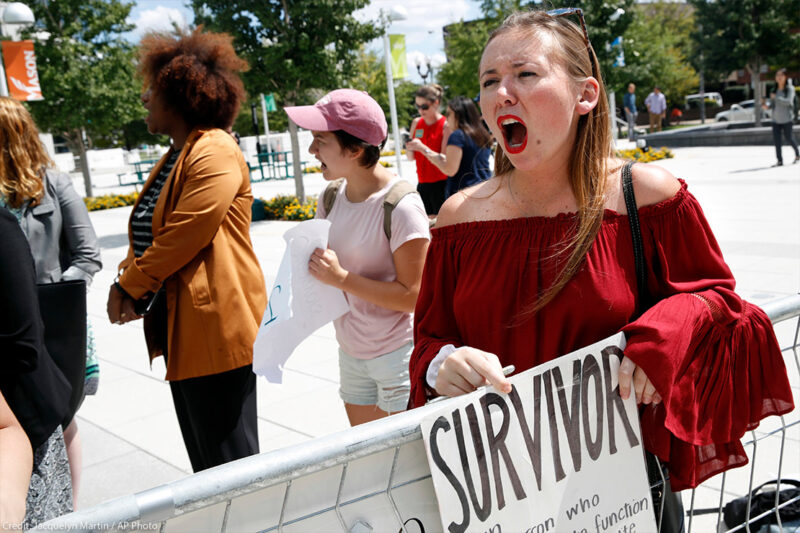DeVos is Rolling Back Protections for Sexual Harassment and Assault Survivors in Schools. We’re Suing to Put a Stop to It.


By the time a student graduates from college — particularly if they are a woman, LGBTQ, a person of color, or have a disability — the odds are high that they have experienced sexual harassment and assault. of women endure sexual assault during their undergraduate education, and face harassment between 7th-12th grade. The experience of assault or harassment does not end with the incident, particularly for students who may have to see their harasser or assailant in class every day. Student survivors often develop anxiety and depression, and struggle to concentrate, which can result in poorer grades and skipping or dropping out of school. A single incident can derail a student’s life. Those students are mostly women.
The DeVos standard redefines what constitutes sexual harassment and assault in disturbing ways. It excuses schools from investigating reports of harassment and assault that take place off campus or schoolgrounds, like at unofficial frat houses, at an apartment on the edge of the campus, or during a school’s own study abroad program. This means that a school would not be obligated to help a middle school student harassed by another student on their way home from school. It means that a university can ignore a report of assault that occurred in off-campus housing — where the majority of college students live. Many commonplace scenarios like these would no longer require an adequate response.
The DeVos standard also allows colleges to ignore reports of assault or harassment unless they are made to the “right” official. Not even the in sports history — USA Gymnastics doctor Larry Nassar’s abuse of , including Michigan State students — would meet this standard, because many of the students reported the abuse to their athletic coaches, not the university’s designated Title IX coordinator. Let that sink in.
The DeVos double standard will prevent many students from reporting abuse, and will let schools off the hook too easily when they do.
For 25 years, the federal government has defined sexual harassment as “severe, pervasive, or objectively offensive” conduct based on sex. ED is now redefining harassment as “severe, pervasive, and objectively offensive” conduct. The word swap makes all the difference. If the DeVos standard goes into effect, that middle schooler harassed on their way home from school every day could be deemed the victim of pervasive harassment, but the conduct will not trigger any responsibility to respond if it does not meet the additional thresholds of severity and objective offensiveness. Even worse, the new policy requires schools to dismiss any Title IX complaint that does not meet this heightened standard. And even where an incident plainly meets the new definition, the rule holds schools accountable only if they are “deliberately indifferent” to sex discrimination.
The impact of the DeVos standard would be devastating for survivors. Already, incidents of sexual harassment and assault are . ED itself estimates 32 percent fewer investigations into sexual harassment complaints in institutions of higher education if the DeVos standard is adopted. Millions of students around the country would be made even more vulnerable to abuse — especially students who are women, LGBTQ, people of color, or have a disability.
Perhaps most egregiously, these provisions erect a double standard, taking sexual discrimination less seriously than other forms of discrimination that are equally prohibited by parallel federal laws that have long been interpreted consistently with each other. ED doesn’t impose such a demanding threshold for complaints of harassment based on race, national origin, or disability. In creating a higher threshold for only sex-based discrimination, DeVos has expressed an inherent skepticism for such claims, implying that students who report sexual assault or harassment should not be treated equally to students complaining of assaults or harassment based on race, national origin, or disability. The DeVos double standard will prevent many students from reporting abuse, and will let schools off the hook too easily when they do. There’s no basis in this country’s civil rights laws for treating sex discrimination differently from discrimination on the basis of race, national origin, and disability.
The ACLU is committed both to ending sexual harassment and assault on campus, and to ensuring fair process for complainants and respondents alike. This lawsuit targets those provisions of the rule that reduce the responsibility of schools to take sexual harassment seriously, and that treat sexual harassment as a second-class problem.
Sexual harassment and assault have no place in our schools. Federal law imposes obligations on schools to make sure that’s the case. Students shouldn’t have to jump through hoops just to report abuse, and schools should not be allowed to ignore claims of discrimination on the basis of sex when they would have to respond to claims of discrimination on other protected grounds. Students have the right to learn without suffering the effects of sex-based discrimination, and today the ACLU is taking DeVos to court to defend that right.

